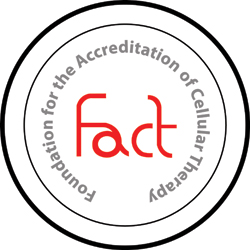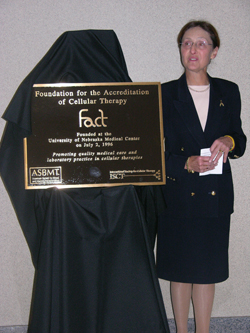 Recently UNMC’s hospital partner, The Nebraska Medical Center, was named twice on the U.S.News and World Report’s list of the best U.S. Hospitals — once for cancer and another for neurology and neurosurgery.
Recently UNMC’s hospital partner, The Nebraska Medical Center, was named twice on the U.S.News and World Report’s list of the best U.S. Hospitals — once for cancer and another for neurology and neurosurgery.
One of the factors U.S.News and World Report considers when compiling the annual list is whether a health care institution has been accredited by the Foundation for the Accreditation of Cellular Therapy or FACT — a non-profit organization based at UNMC that monitors the quality of cellular therapy around the globe.
And it’s not just U.S.News and World Report that pays attention to what institutions the group accredits — many major insurance providers demand that health care institutions have FACT accreditation. Also, many local health departments require health care facilities to have FACT accreditation before they receive their certificates of need.
“FACT accreditation is very important for any cell therapy program,” said Marcel DeVetten, M.D., an associate professor in UNMC’s oncology/hematology section. “Aside from the fact that insurance companies are now asking that programs have FACT accreditation, getting the organization’s approval means that your program has conformed to rigorous standards that are meant to ensure a high-quality of patient care.”
FACT — which helps regulate cellular therapies such as bone marrow transplants — first came to UNMC in 1996 under the direction of Phyllis Warkentin, M.D., who still serves as the group’s medical director.
It arose out of a national call to monitor cell therapy in clinics and laboratories, as well as at the level of cell collection. FACT’s founding board of directors charged Dr. Warkentin with setting up the group and implementing its operations.
 |
Phyllis Warkentin, M.D., stands next to the bronze plaque that was dedicated in honor of FACT’s 10-year anniversary in 2006. Dr. Warkentin has been medical director of FACT since its inception and has seen it grow from a volunteer effort into a thriving operation that insurance companies and media outlets look toward to judge a cell therapy program’s status. |
Dr. Warkentin said FACT started as a volunteer effort among several people around the nation, but the group quickly realized the need for such regulation was great.
Since 1996, FACT has grown into a full-fledged operation that employs about 12 people at its office on 69th and Dodge streets in Omaha.
FACT has printed three editions of its accreditation standards with a fourth edition due out shortly. Since 1996, the group has accredited 163 cell therapy centers in the United States and Canada. It also has accredited 15 cord blood centers in 17 countries around the world.
FACT trains inspectors internationally who then visit health care institutions and report their findings back to the UNMC group, which decides if an institution receives accreditation.
Accreditation is a rigorous process that requires organizations to conform to about 130 pages of regulations, said Dr. DeVetten, who has been a part of the process as both an inspectee and inspector.
UNMC, Dr. DeVetten said, he has been inspected three times since 1996 and has seen its cell therapy operations improve significantly following each inspection.
The groups he has inspected have reported similar results, Dr. DeVetten said.
FACT’s growth in size and stature has been very satisfying, Dr. Warkentin said.
“Our primary goal is to make sure we help improve cell therapy operations and conversely, patient care,” she said. “But seeing that insurance companies and media outlets now pay attention to what we do, well, it’s external affirmation that what we do is of value.
“And that does feel good.”